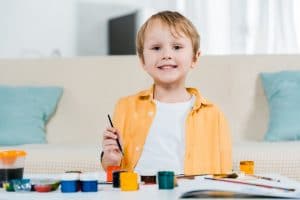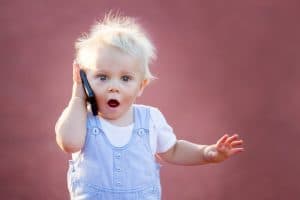by Darrell
“Whoa, whoa, oa-oa-oa, sweet child o’ mine…” Whose child is it?
I was standing next to my wife the other day while we were at a kid’s party. While talking to some other parents, I heard my wide refer to “MY son…” Even though I was part of the conversation, it would seem that “our” child in question is hers, and hers alone.
Okay, so it might sound a bit over the top for me to be pulling her up on this. And sometimes it is fine to refer to your child as “mine.” But there comes a point where “mine” becomes possessive and excludes the other parent.
Nearly all children go through a “mine” stage. When this happens, we as parents try to breed this out of them. Often the thing is not theirs. Often the item is theirs but we want to encourage sharing. Often the item belongs to all of your children or the whole family so you need to explain to the child that it is not just theirs. And the child, the child is not just your child, but it is the product of the mother and the father, and as a result, the child should never really be referred to as “mine” but “ours.”
I have witnessed many people going through relationship difficulties and asking for advice in parenting forums. The language used in these forums pretty much sums up for me a major issue that some, possibly many, of the problems in the relationship can be attributed to.
“My husband and I are having problems in our marriage. I am thinking about leaving and taking my kids with me. I would like some advice…” See, right there; right in the question that is being posed, a possible cause of the problem has raised its ugly head. Possession.
If within your family structure any of the parents are thinking about the children as being theirs and theirs alone (even subconsciously), pressure is put upon the relationship when the subconscious becomes the conscious and one parent (or both parents) start to parent in different ways.
But surely changing the word used to describe the possession of the child or children cannot help in fixing the problem, I hear you say. It sure can. If the way we think about the relationship between the parents, and then that of the parents as a collective to the child or children, we can steer the ship in the right direction. And if the family does hit an iceberg, there is not just one person left to go down with the ship, but the whole crew will be there bucketing out the water.
I am sure in many households where there are multiple cars there is the scenario “Daddy’s car” and “Mummy’s car.” I am sure there might also be those households that have the scenario “this car is mine, that car is ours.” If we put either of those into an analogy based on what I am talking about in this article, the mindset on whose car it is really comes down to certain factors like “my car” is a car that I drive 99.9% of the time, I fill up the petrol, I wash and clean the car, and it might also be a company car.
“Daddy’s car” might be the more compact car that Daddy drives to the station on weekdays. “Mummy’s car” might be the big family SUV that gets used for driving the kids to school during the week but Daddy (or Mummy) drives the family around in on the weekend. “Mummy’s car” in this situation could easily also be known as “our car” but then I am sure that would imply both drivers are collectively responsible for the upkeep, filling up of petrol and all those other fun things that go into jointly owning a car.
How does this relate to the children? They can’t be just Mummy’s or Daddy’s children, can they? They are the children of the Davison family. The kids are not just looked after by mum (are they??). The children are not just looked after by dad (are they??) Hopefully the answer to both those interjected (and optimistically rhetorical) questions is a resounding “no.”
Because you see, if you keep referring to the kids as “mine” and keep thinking of the kids as “yours, and yours alone” then the way you will make decisions for the children will be very one-sided. There will be no bipartisan approach to your parenting. There will only be an independent style of parenting.
And what does this lead to? It leads to the breakdown of the family unit, the destruction of the relationship, the separation and in turn divorce of the parents. And then what are you left with? You are left with you having “your” kids on this weekend, and then on the following weekend, in the words of your estranged partner, “the kids are mine…”
“All mine.”
Darrell Milton is a father, husband, son, brother, cousin and holds many ’in-law’ titles. He is also a song writer, poet, speech writer, musician, writer of short stories and a social media junkie. With an opinion on everything you would never hear the phrase ’long time listener, first time caller’ from him. You can follow him on Twitter and Facebook, or visit his blog.













